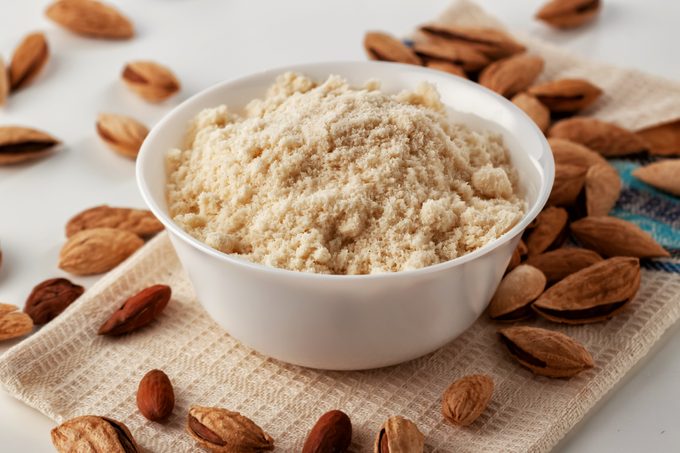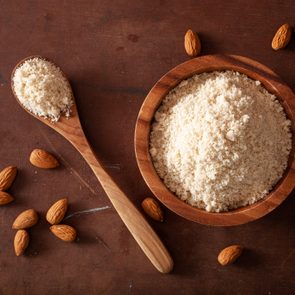7 Nutrition Facts to Know About Almond Flour, According to a Registered Dietitian
Updated: May 19, 2021
Almond flour is popping up in recipes and baked goods at home and in stores. But is almond flour healthy? Here are the nutrition facts you need to know, according to a registered dietitian.
Almond flour nutrition facts
It seems as if refined, white flours are taking a back seat in the kitchen these days. Substitutes for regular flour are becoming more popular for cooking healthfully and baking healthy desserts.
Refined, white flours commonly used in baked goods, bread, and snack foods lack many important nutrients, including fiber, antioxidants, vitamins, and minerals. In fact, studies have found that ultra-processed foods like white flour are associated with an increased risk of chronic diseases, like heart disease and type 2 diabetes, according to research in the BMJ and JAMA International Studies.
People looking to swap out basic white flour with a gluten-free and more nutrient-dense option don’t need to look further than one of my favorite healthy flour substitutes—almond flour.
What is almond flour?
Almond flour comes from blanched or raw, ground almonds. Some products are ground coarse with the almond skins included, and others are finely ground and made with almonds that have had their skins removed. Here’s how to make almond flour if you’re looking to make it yourself.
Either way, almond flour’s versatility makes it extremely popular among culinary and health enthusiasts alike. You can find almond flour in just about any recipe, from muffins to biscuits and even breaded chicken. It’s wheat-free and gluten-free, so it’s a good option for people with signs of celiac disease or a gluten sensitivity. But is almond flour really that healthy?
Keep reading to find out the nutrition facts you need to know about almond flour and the evidence-based health benefits that show it’s worth adding to your healthy food swaps.

Almonds are a good source of monounsaturated fats
Almonds are one of the healthiest nuts you can eat. Specifically, they are one of the best foods you can eat to help prevent cardiovascular disease. They are a great source of plant-based monounsaturated fats, which have been found to reduce LDL (bad) cholesterol and total cholesterol and increase HDL (good) cholesterol. Both of these are key factors in preventing cardiovascular disease, according to research in the journal Atherosclerosis.
Almonds have magnesium
Almonds are packed with an important heart-healthy mineral: magnesium. According to the USDA, one ounce of almonds has almost 80 milligrams of magnesium, about 20 percent of the recommended daily intake for average adults. Some research in Open Heart found that magnesium deficiency is associated with several cardiovascular diseases, including hypertension, cardiomyopathy, cardiac arrhythmia, and atherosclerosis.
Almond flour has fewer net carbs
With only 4 grams of carbohydrates per 1/4 cup, substituting traditional white flour for almond flour is a great way to reduce overall carbohydrate intake, and increase protein and fiber intake, helping balance blood sugar. (Net carbs are the total number of carbs minus the fiber content.)
Lowering overall carbohydrate intake and eating more complex carbohydrates instead of refined carbohydrates is a key strategy for managing type 2 diabetes and lowering blood sugar. Type 2 diabetes is a serious chronic disease that affects about 1 in 10 Americans.
Interestingly, a 2020 study in the journal Nutrients looked at the blood sugar-lowering effects of low carbohydrate diets with and without almonds in people with type 2 diabetes. Results indicated that the people who added almonds to their low carbohydrate diet had even better glycemic control than those who ate low carbohydrate diets without almonds. Researchers suspect that the added benefit of anti-inflammatory nutrients like vitamin E may help give almonds an extra edge for balancing blood sugar.
Almonds are one of the best sources of Vitamin E
Almonds are one of the best food sources of vitamin E, a potent antioxidant that’s an essential vitamin, which means that we rely on eating enough of this nutrient in our diet to meet our health needs.
Unfortunately, data from the National Health and Nutrition Examination Survey (NHANES) shows that more than 90 percent of American adults do not meet their estimated average vitamin E requirements.
Not getting enough vitamin E in your diet can have a major impact on your health. Vitamin E may prevent the formation of plaques in your arteries and blood clots that can lead to stroke, per the National Institutes of Health (NIH). Studies have found that vitamin E may help prevent coronary heart disease, decrease the risk of certain cancers, and reduce the risk of age-related macular degeneration and cataracts, according to the NIH.
Of note, most of the studies on vitamin E found that eating vitamin E in foods like almonds and almond flour was more beneficial and less harmful than taking vitamin E supplements.
Almond flour has lots of protein and fiber
While almonds and almond flour may have more calories than white flour, they are also a high-protein and high-fiber food, which helps keep you fuller longer, stabilizing your appetite, and helping you eat fewer calories overall.
Although losing weight and keeping it off requires a holistic approach that includes eating more vegetables, fruits, healthy protein, moving more, and stress management, eating more almonds may give you an extra edge in meeting your goals thanks to the protein and fiber.
One randomized controlled trial in Nutrients looked at two groups: One ate a low-calorie diet with 15 percent of calories from almonds for 12 weeks, and the other ate a low-calorie diet without almonds for 12 weeks. The study found that both groups lost weight, but the participants who followed a low-calorie diet with almonds lost more total fat and abdominal fat.
Almonds contain antioxidants
Antioxidants are powerful compounds found in foods, especially plants, that help neutralize free radicals in the body that may contribute to several diseases, including cardiovascular disease, type 2 diabetes, cancer, and inflammatory joint diseases, among others, per a review in the Australian and New Zealand Journal of Ophthalmology.
Getting more antioxidants in your diet is essential for minimizing inflammation and protecting your cells from oxidative damage. Almonds, especially almond skins, are one of the best foods high in antioxidants because they contain various antioxidant plant compounds, including flavonoids.
As I mentioned earlier, almonds are also high in vitamin E, another potent antioxidant. Together, the high flavonoid and vitamin E content of almonds make almond flour an antioxidant powerhouse.
Just keep in mind that many of the antioxidants in almonds are in the skin. So choose almond flour made with almonds that have been ground with their skins so you can maximize its antioxidant benefits.
Almond flour is gluten-free
Yes, almond flour is gluten-free. In fact, it’s one of the most popular grain- and gluten-free flours people with gluten sensitivity or celiac disease love. If you choose to buy pre-packaged almond flour, always check the label to ensure that it’s not from a facility that also processes gluten. (Beware of these common foods with gluten.)
So next time you get an itch to bake a treat, try using almond flour instead of white flour. Your heart, blood sugar, and waistline will thank you for the extra nutrients. Here are some almond flour recipes to get you started.























